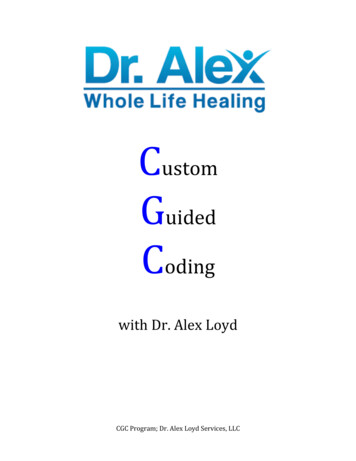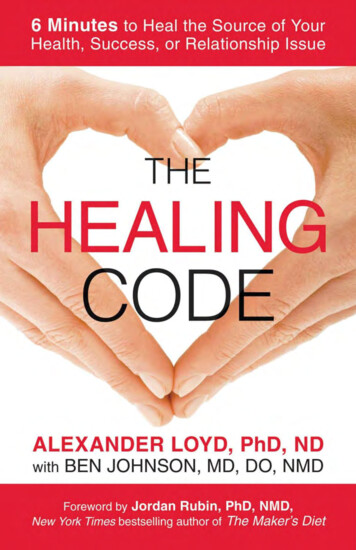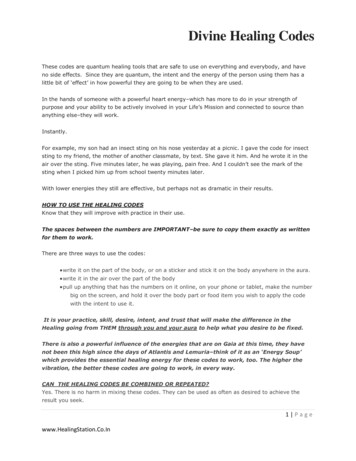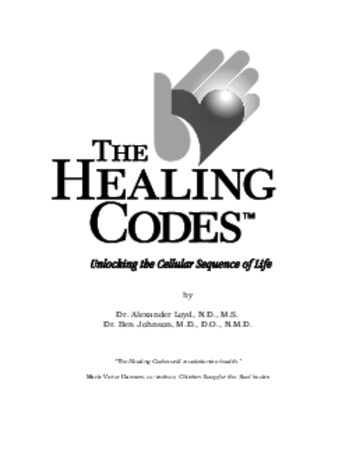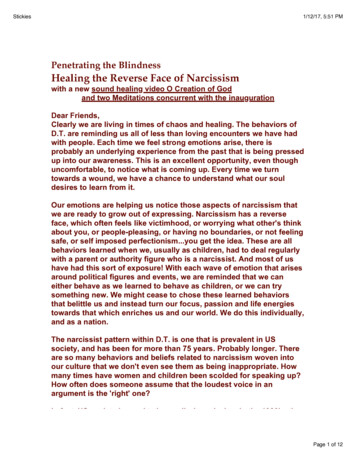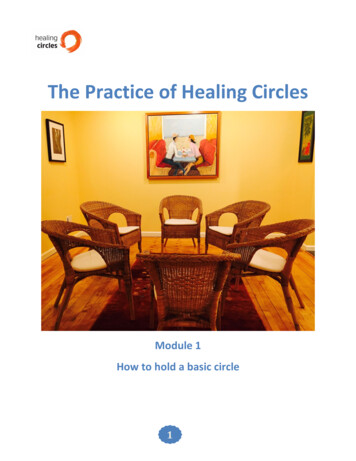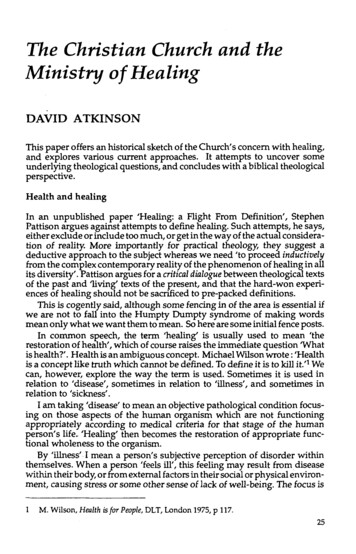
Transcription
AFTERtheAFFAIRHealing the Painand Rebuilding TrustWhen a Partner HasBeen UnfaithfulJANIS ABRAHMS SPRING, PH.D.WITH MICHAEL SPRING
To my best buddies,Aaron, Max, and Michael
ContentsAcknowledgmentsviIntroduction—Can a Couple Survive Infidelity?1Stage OneReacting to the Affair: “Is What I’m Feeling Normal?”71 The Hurt Partner’s Response: Buried in an Avalanche ofLosses92 The Unfaithful Partner’s Response: Lost in a Labyrinth ofChoices37Stage TwoReviewing Your Options: “Should I Stay or Leave?”613 Exploring Your Ideas About Love634 Confronting Your Doubts and Fears80Stage ThreeRecovering from the Affair: “How Do We Rebuild Our LifeTogether?”1075 Learning from the Affair1096 Restoring Trust1477 How to Talk About What Happened1678 Sex Again1929 Learning to Forgive234Epilogue—Revealing the Secret: Truth and t the Authors
PraiseCoverCopyrightAbout the Publisher
AcknowledgmentsWhen I first started giving workshops in couples therapy, I’d leave fifteen minutes at the end to discuss the treatment of infidelity. Gradually,as it became clear that virtually nothing had been written on how tohelp couples who were trying to recover from an affair, I decided tofocus my talks and private practice on this topic, and to write this book.At first, I got mixed reactions. Patients and therapists said, “Great.When can I get a copy?” Friends said, “How exciting. Let’s have aparty.” Acquaintances said, “Thank God this has nothing to do withme.” Publishers and editors said, “Yes, there’s definitely a need for sucha book, but will anyone be brave enough to pick it up and bring it tothe cashier?” While I was looking for an editor, I found that more thanone was afraid to touch it for fear that it would stir up problems in theirrelationships. “I have a good marriage,” one editor told me. “I’m afraidthis material will infect us.” Fortunately, once HarperCollins boughtthe book, and my husband, Michael, agreed to help me write it, everyoneseemed to stand behind it.I never knew what it meant, or took, to write a book. Now I know.And now, every time I walk into a bookstore or library, I am in awe ofthe incredible expenditure of time and energy so many people makejust to put their ideas into print.
I went into this project thinking I was an expert, but the more I interviewed and treated couples, the more I learned. As Anna says in TheKing and I, “By your pupils you are taught.” By listening to my patientsand others who have endured a betrayal or who have had affairsthemselves, I came to understand how individuals cope with and resolve—or fail to resolve—their infidelity crises. Their candor and selfscrutiny made it possible for me to recognize patterns in what peopleexperience and what they need to heal.There are many people I’d like to thank for helping me bring thisbook to completion, including those mentors and colleagues who trainedme. When I was just out of graduate school, Dr. Aaron T. Beck, founderof cognitive therapy, let me sit by his side and observe him supervisingstudents at the Center for Cognitive Therapy. He taught me when tointervene and when to remain silent, when to critique a belief and whento leave it alone. He provided a model of therapy and a career for methat has helped me become an effective therapist. I also was fortunateto be supervised by Dr. David D. Burns, who taught me with humorand ingenuity many strategies to help people change. I extend deepappreciation to Dr. Jeffrey Young, who integrated cognitive therapywith other established models and significantly expanded its effectiveness in dealing with more intractable clinical problems. He combedthrough sections of this manuscript, offering detailed comments abouthow our childhood affects who we are today. My thanks to Dr. AlbertEllis, Dr. Richard Stuart, Dr. Neil Jacobson, Dr. Norman Epstein, Dr.Don Baucom, Dr. Chris Padesky, and Dr. David Bricker—all of whomhave furthered my application of cognitive-behavioral principles to thetreatment of distressed couples.Claire Quigley at the Westport Public Library and Kristina Coop ofthe University of North Carolina provided much needed library andresearch assistance.When everyone else was still debating the salability of this book, myagent, Chris Tomasino, stood by me and encouraged me. She also readevery word of the manuscript and offered astute editorial suggestions.Her assistant, Jonathan Diamond, was always available to help me.I thank Peternelle van Arsdale, Janet Goldstein, and Gail
Winston, my editors at HarperCollins, for shepherding me through thisprocess. My gratitude also to Clio Manuelian, my publicist, for hercontagious enthusiasm; Kristen Auclair for managing countless editorialdetails; and Guy Kettelhack for his help in preparing the proposal.Also, I thank with all my heart:My parents, Dolly and Louis Lieff, for years of sacrifice to give me agreat education, and for encouraging me to develop my own separatevoice.My brother, Joel, for being a kind soul and always looking out forme.My stepchildren Declan and Evan, for their wisdom, and for all thegood times we’ve shared together, away from the computer.My children, Max and Aaron, who have brought laughter andmeaning to my life. I’m so lucky to have lived these years with themby my side.And my husband, Michael: Is there any activity more intimate thanwriting a book with someone? I respect (and envy) his perfectionisticeye and extraordinarily clear mind. I’ll miss those hours sitting elbowto elbow with him at the computer, fighting fiercely over a word orconcept. I thank him for the ton of time he gave this manuscript, andfor his wonderful good nature, which kept us going.
IntroductionCan a Couple Survive Infidelity?As a clinical psychologist who has been treating distressed couples fortwenty-one years, I answer yes—provided that each of you is willingto look honestly at yourself and at your partner, and acquire the skillsyou need to see yourself through this shattering crisis.It may help to remind yourself that you’re not alone. Statistics varywidely,1 but according to one of the most recent and reputable studies,as many as 37 percent of married men and 20 percent of married womenhave been unfaithful.2 No one knows the exact percentages; I’m surethat someone who lies to a spouse might also lie to a researcher. Buteven by the most conservative estimate, we can say with some confidence that, in the United States, 1 in every 2.7 couples—some 20 million—is touched by infidelity.3WHAT CONSTITUTES AN AFFAIRMust an affair be coital? What about a kiss? What about lunch?4I don’t try to answer these questions because, in the end, what mattersis what matters to you. A breach of trust depends entirely on what youagreed to—or thought you agreed to. Virtually all of you would feelbetrayed by a partner who had intercourse with a third person,whether during a one-night stand or as part of a
2 / AFTER the AFFAIRlong-term emotional entanglement. But many of you would also feelbetrayed, and certainly threatened, by other intimate behaviors—a hug,say, or the sending of a dozen white roses. Five years ago a patient ofmine named Sharon took her blouse off and showed her breasts to herbest friend’s husband. They never went further, but the two coupleshave been struggling with this violation ever since.Another type of affair involves the sex addict—a person who attemptsto counter feelings of low self-esteem with compulsive or uncontrollablesexual activity.5 This is a specialized disorder that is beyond the scopeof this book.THREE JUDGMENTS I DON’T MAKE1. I don’t make blanket judgments about whether affairs are, in themselves,good or bad. What may be enhancing for one of you may devastate theother, and destroy the relationship. I have found, however, that a continuing affair, without the consent of both partners, perpetuates thedysfunction in a relationship and makes the forging of an intimate attachment virtually impossible. If you’re an unfaithful partner who isserious about reconnecting, you must, I believe, give up your lover.2. I don’t separate the two of you into victim and victimizer, betrayed andbetrayer. Each of you must accept an appropriate share of responsibilityfor what went wrong. Rather than assign blame, I encourage each ofyou to confront those parts of yourself that led to the affair, and tochange in ways that rebuild trust and intimacy. That doesn’t mean Ihold you equally accountable for the affair—no one can make anotherperson stray. But I do ask you both to be accountable for the distressthat may have contributed to the affair.3. I don’t suggest that you should stay together no matter what, or bolt justbecause you feel unhappy. Instead, I invite each of you to explore with meyour unique reasons for having or giving up a lover, for choosing orrefusing to recommit. Your decision should be deliberate and wellconsidered, not based on feelings alone. Your feelings, in fact, may betray you.
JANIS ABRAHMS SPRING, PH.D.WITH MICHAEL SPRING / 3A WORD ABOUT THE CHOICE OF TERMSThroughout the text I refer to partners as hurt or unfaithful. The hurtpartner is the person in the primary relationship whose assumption ofmonogamy has been violated. The unfaithful partner is the one whohad the affair. It was difficult choosing labels for these people. Certainlythe unfaithful partner may feel equally hurt at times. In general, however, it’s the one whose partner strays who experiences the greater senseof devastation. I don’t categorize partners as betrayed or betrayer becausethese words convey a certain moral righteousness or condemnation,and put the burden of responsibility on one partner alone, which is almost never the case. I refer to the person with whom you or your partnerhad the affair as the lover, whether the relationship is terminated orongoing.The quotes and case studies I refer to throughout the text are drawnfrom my practice over the years, but I’ve masked all identities so thatI don’t violate any confidences.WHO IS THIS BOOK FORI wrote After the Affair primarily for any two people who want to rebuildtheir relationship after one of them has been unfaithful. This includesmarried and cohabitating couples, heterosexuals and gays. I try to address hurt and unfaithful partners with equal weight.My book is also for: people whose relationship ended as a result of infidelity, who are havinga difficult time moving beyond the experience, and who want to understand why the relationship didn’t survive and what they should acceptas an appropriate share of responsibility for what went wrong; people who want to make better sense of the infidelity they experiencedin their own families when they were growing up, in order to avoidsimilar patterns of behavior in their own relationships; professionals and spiritual leaders who treat individuals and couplesaffected by infidelity; 6
4 / AFTER the AFFAIR partners who are thinking of having an affair and who want to understand their feelings better before taking any irreversible steps; partners who want to think through the advantages and disadvantagesof revealing a terminated affair; partners who have no intention of disclosing a terminated affair, butwho still want to rebuild their relationship and learn about themselves; partners who suspect their mates of infidelity but have never confrontedthem; couples who are struggling with secrets, lies, and trust issues other thaninfidelity; couples who want to learn how to cope with the inevitable disenchantments of conjugal life, before turning elsewhere.THREE STAGES OF HEALINGThe book guides you through three identifiable stages—some wouldcall them minefields—as you react to, grapple with, and recover fromthe affair.The First Stage: Normalizing Your FeelingsOnce the affair is revealed, both of you are likely to get swept up inan emotional whirlwind, the hurt partner overcome by a profoundsense of loss, the unfaithful partner overcome by conflicting choicesand emotions. By giving a language to your feelings, I hope to reassureyou that you’re not crazy or unstable, that others have experienced thesame pain and confusion, that you’re not alone.7The Second Stage: Deciding Whether to Recommit or QuitBefore your emotions can settle down, you need to confront yourambivalence about whether to stay or leave. By exploring your options,you’ll be able to make a thoughtful decision based on your circumstances and needs. “What can I expect from love?” “Should I
JANIS ABRAHMS SPRING, PH.D.WITH MICHAEL SPRING / 5trust my feelings?” “How can I tell if my partner is right for me?”—theseare the types of questions I’ll help you answer.The Third Stage: Rebuilding Your RelationshipIf you decide to recommit, you’re likely to spend months, perhapsyears, working to restore trust and intimacy. By reviewing strategieswith you, I hope to give you the tools to: decipher the meaning of the affair, and accept an appropriate share ofresponsibility for it; say goodbye to the lover; earn back trust (if you’re the unfaithful partner), or communicate whatyou need to trust again (if you’re the hurt partner); talk in ways that allow your partner to hear you and understand yourpain, and listen in ways that encourage your partner to be open andvulnerable with you; recognize how you may have been damaged by early life experiences,and how you can keep these experiences from contaminating your relationship today; manage your differences and dissatisfactions, so that you can stay attached even when you don’t feel particularly loved or loving; become sexually intimate again; forgive your partner, and yourself.I assume throughout the book that the secret is known, but in somecases it won’t be. In the Epilogue, I help you, the unfaithful partner,weigh the pros and cons of telling. Whatever you decide, you and yourpartner can still work to renew your life together.A DEATH KNELL OR A WAKE-UP CALLSome of you may not want to risk starting over and exposing yourselfto further hurt or disappointment. Turning your back on a dam-
6 / AFTER the AFFAIRaged relationship may be the simplest or most sensible solution, onethat frees you from the tyranny of hope. But it may also be a way toescape growing up, facing some bitter truths about life, love, andyourself, and assuming the terrible burden of responsibility for makingyour relationship work.This book reaches out to those of you who are deeply wounded byan affair but are conflicted enough or courageous enough to admit thatyou may still want to stay together, confront how you each contributedto the infidelity, and work to rebuild trust and intimacy. If you chooseto recommit to each other, you may in time come to see the affair notmerely as a regrettable trauma but as an alarm, a wake-up call. Youmay eventually discover that you needed a nuclear explosion like anaffair to blow your previous construction apart and allow a healthier,more conscious and mature version to take its place. Given how batteredyou both feel, you may not have many chances to test the strength ofyour relationship. I encourage you to enter the process, to challengethe hurt, and to see what you’re capable of producing together. In essence, on the count of three, I invite the two of you to step into thecenter of the ring, remove your boxing gloves, and join hands.
Stage OneREACTING TO THE AFFAIR: “ISWHAT I’M FEELING NORMAL?”
1The Hurt Partner’s Response:Buried in an Avalancheof Losses“When I was fifteen, I was raped. That was nothing comparedto your affair. The rapist was a stranger; you, I thought, weremy best friend.”“When I first uncovered your secret, I stopped feeling specialto you. But on a deeper level, I lost trust in the world and inmyself.”These comments only begin to suggest the profound and sweepinglosses you’re likely to experience when you first learn that your partnerhas been unfaithful. There’s no way to prepare yourself for this crushingrevelation. Your view of your life and the world you live in may beripped apart. Whatever self-assurance and security you felt in the pastmay now seem naive or false. “Where have I been?” you ask yourself.“Do I live on this planet?”Your mind and body are likely to be in shock. Gone is your fundamental sense of order and justice in the world. Gone, too, are your senseof control over your life, your self-respect, your very concept of whoyou are. You may feel abandoned by everyone—
10 / AFTER the AFFAIRfamily, friends, God. A stranger to yourself, you may swing wildly fromone extreme to another, determined and confident one moment, humiliated and needy the next. Battered by feelings so intense, you may startto wonder, “Am I going crazy?”I want to assure you that you’re not—that, in fact, what you’re experiencing is a normal and appropriate response to an acutely traumatizingexperience. You’re reeling not only from the loss of the integrity of yourrelationship, but also from the loss of an illusion—that you’re specialto your partner, and that the intimacy you thought you shared withthat person would last forever. In the face of such shattering news, itwould be strange if you didn’t feel lost.It took Marsha, a forty-year-old social worker and mother, more thana decade to find her feet again:After thirteen years of marriage, Larry announced he was tradingme in for the baby-sitter, a girl fourteen years his junior. My firstreaction was, “This couldn’t possibly be happening to us, we’rethe perfect couple. The baby-sitter’s almost a daughter to me, howcould she betray my trust?” When Larry moved in with her, I wentto bed for a month. Overnight, I went from a person who wascapable, independent, full of zest, to a total zombie—paralyzedby a depression I had known only from an academic distance. Onenight I was lying in bed comparing the silence in the house withthe terror and confusion in my head, when I heard the garage doorrattle open. “He’s come back,” I thought. “He wants to work itout.” I raced downstairs in my pajamas—first looking in the mirrorto check how I looked—only to realize that the garage door hadnever budged. I had imagined the whole thing. It suddenly occurred to me: “I’ve not only lost my spouse, I’ve lost my mind.”My confidence continued to plummet. I saw myself as a fraud, ahollow shell, too empty to practice therapy, parent a child, or deserve a decent partner. Life belonged to others, not to me. I wasstill struggling with my depression three years later—long aftermy husband and I were back together—when I learned in aworkshop on Post-Traumatic Stress Disorder1 that someone underextreme emotional stress is likely to withdraw from life and losetouch with themselves, even experience delusions. My
JANIS ABRAHMS SPRING, PH.D.WITH MICHAEL SPRING / 11mind clicked: So that was it. My depression had a name. I wasn’tcracking up; what I was going through was normal. If only I hadknown earlier, I would have felt less alone and perhaps openedmyself up sooner to the possibility of a future. If only someonehad helped me understand what happens, that would have beenan act of supreme kindness.This is where this chapter begins, in preparing you for the lossesvirtually all hurt partners are bound to experience in the crucible ofinfidelity. Once you realize how universal your responses are, you’relikely to feel less gutted by the betrayal, less rocked by your own fierceemotions. Once you can anticipate your reaction and give it a name, itshould become more tolerable to you. The healing process begins whenyou bear witness to your feelings and make sense of your pain. What’scritical to remember is this: The greatest threat to recovery is the lossof hope itself.THE PHYSIOLOGICAL IMPACT OF THE AFFAIRIt’s likely at this moment that you’re undergoing physiological changesin both your nervous system and your cognitive functioning. Asadrenaline and other stress-related hormones pour into your sympathetic nervous system, you experience a heightened state of arousal. You’reconstantly on the lookout for signs that your partner is straying again.Chronically anxious and agitated, you take longer to fall asleep, awakenfrequently during the night, and are more sensitive to noise. You becomeexhausted from sleeping too little and thinking entirely too much.Your mind is punctured by vivid and upsetting memories, sensations,images. When you are asleep, the quality of your dreaming becomesmore violent and alarming. When you are awake, you find yourselfsuddenly lost or otherwise disoriented.What happened to Gloria, a thirty-year-old journalist, is typical. “Theday after my husband admitted he was having an affair, I got lost goingto work,” she told me. “I was terrified that I was going crazy. I mean,this was a route I had followed daily for five years.”Pam, a thirty-seven-year-old real estate agent, tells a similar story:“When Jeff admitted that he was in love with another woman,
12 / AFTER the AFFAIRI made him pack his bags and move out. The next weekend I went tovisit friends on Block Island to avoid facing my loneliness. On my wayI stopped at a golf tournament and walked the course. So far, so good.But when it came time to return to my car, I couldn’t remember whereit was. I finally found it after an hour of searching, but I was so shaken,I drove home crying all the way. I canned the weekend and stayedhome in bed instead. It wasn’t my spaciness that upset me so much, itwas the meaning I gave to it, that I was losing my mind.”Because of alterations to your nervous system, your intense emotionsmay overwhelm you with a sense of terror and helplessness. “The wholeapparatus for concerted, coordinated and purposeful activity issmashed,”2 writes Abram Kardiner, describing the neuro-physiologicaleffects of trauma.Another, very different physiological change takes place with therelease of endogenous opioids, similar to morphine, into your nervoussystem. This dulls your perception of pain and shields you from extremeemotional stress. In other words, your body constricts, goes into hibernation, shuts down. Your range of feelings and sensations narrows, andyou lose interest in relationships and activities that only weeks beforegave you pleasure and purpose. As you struggle to pull yourself together, you find yourself barely functioning. Your mind wanders. You havetrouble concentrating. At work, you shuffle papers across your desk;at home, you sit staring off into space. Having lost confidence in yourability to interact with the world, you shrink back into yourself, intoisolation. You feel oddly numb and detached.“It’s like going through the motions of living, aware that a part ofyou has died,” explained Stephanie, a forty-two-year-old special education teacher. “I once felt like John and I were connected by a goldenthread. I’d glance across the room and feel the energy drawing us toeach other. Now the best I can say is, I’m managing. We’re still together,but inside I’m dead.”In his novel Separation, author Dan Franck describes the hurt partner’semotions as the reality of his wife’s affair sinks in: “He has been livingin terror; but it now gives way to smooth, dull shores of sadness. Terroris mobile; sadness stagnant. Like water in a vase.”3
JANIS ABRAHMS SPRING, PH.D.WITH MICHAEL SPRING / 13THE PSYCHOLOGICAL IMPACT OF THE AFFAIRThere are nine different types of losses that you, the hurt partner, arelikely to experience. All are variations on one very basic loss, one thatgoes beyond the loss of your partner: the loss of self. It may be hard foryou to recognize this loss in any of its forms, because none of them istangible. But though you look the same to others, inside you’re likelyto be hemorrhaging. Suddenly you feel you’ve lost your:1.2.3.4.5.6.7.8.9.IdentitySense of specialnessSelf-respect for debasing yourself and forfeiting your basic values towin your partner backSelf-respect for failing to acknowledge that you were wrongedControl over your thoughts and actionsFundamental sense of order and justice in the worldReligious faithConnection with othersSense of purpose—even the will to liveLoss of Identity: “I no longer know who I am.”The discovery of your partner’s affair forces you to redefine yourselfin the most fundamental way. “If you, my life partner, are not the personI thought you were, and our marriage is a lie, then who am I?” you ask.Suddenly you see yourself as fractured, disfigured, different from howyou’ve ever known yourself before.In the past, you may have described yourself as capable, independent,funny, bold, friendly, warm, stable, loving, generous, attractive. Nomore. Now you experience yourself in a hundred negative ways—asjealous, enraged, vengeful, out of control, petty, diminished, bitter,frightened, lonely, physically ill, defiled, ugly, mis-
14 / AFTER the AFFAIRtrustful, socially disgraced. Blinded by your partner’s deception, youlose sight of your familiar self and doubt your goodness, your desirability, your basic ability to negotiate with the world.“‘Vibrant, athletic, plucky’—that’s what they called me in my collegeyearbook,” reminisced Jane, a thirty-one-year-old accountant marriedfive years. “Now, after John’s affair, I don’t seem to have the energy,or inclination, to even go outside. I feel too exposed.”Roberta, married fourteen years, also grappled with her sudden lossof identity. “I used to like myself. I used to think of myself as a niceperson, as a loving, lovable human being. That’s gone. I can’t stopthinking that the reason Don cheated on me is because I’m too sweet,too ordinary. Maybe I’m alone for a reason. Maybe no one worthknowing would want to be in a relationship with me.”If you’re as depressed as Roberta, you’re likely to magnify your defects and accept excessive blame for your partner’s adulterous behavior.Whatever you loathed about yourself now defines you. You alone, youassume, have caused this terrible thing to happen. “If only I remodelmyself, I can win my partner back,” you think, deceiving yourself intobelieving that the fate of your relationship is in your hands. Later on,you should be able to look at yourself more objectively, and assignblame more equitably. Right now, though, you’re unlikely to have thedistance or perspective to be fair to anyone, least of all yourself.The loss of your basic sense of self is an injury that cuts much deeperthan the infidelity itself. What could be more distressing than the experience of being stuck in skin that feels alien to you, disconnected fromthat core self you always counted on to tell you who you are?Loss of Your Sense of Specialness: “I thought I meantsomething to you. Now I realize I’m disposable.”Swept away with your sense of self is your conviction that you andyour partner were meant for each other, that no one could make yourpartner happier, that together you formed a primal and irreducibleunion that could not be shared or severed. The affair marks the passingof two innocent illusions—that your marriage is exceptional, and thatyou are unique or prized.By the time Miriam reached her teens, she had been raped by herstepfather and abandoned by her mother, who refused to believe her
JANIS ABRAHMS SPRING, PH.D.WITH MICHAEL SPRING / 15allegations. Miriam came to view herself as damaged goods and foundherself drawn to men who treated her as shoddily as her parents had.After putting herself through secretarial school, she got a job as a receptionist at a law firm. There she met Ed. At first she distrusted his interestin her—why would anyone be drawn to her for herself? she wondered.Gradually, however, she came to rely on his generosity and protection.After living with him for three months, she agreed to marry him. Shewasn’t passionately in love with him, but he was the first man whomade her feel decent, valued, clean. When she discovered, a year later,that he was sleeping with his secretary, she lost her newly found selfesteem. “You were the most special person in the world to me,” shetold him, “my best friend, the first person I could totally trust. I feltcompletely safe with you and could tell you anything. But whatmattered even more was that you allowed me to believe in me—that Iwas okay, that what had happened to me as a child wasn’t my fault,wasn’t because I was bad. For the first time in my life I felt special andloved for who I was. Now I realize that I’m disposable, garbage.”When you, like Miriam, are willfully discarded by someone who oncemade you feel irreplaceable, you may devalue yourself not only as apartner but as a parent. Demoralized by the destruction of your nuclearfamily, you may write off your importance to your children, and believethat you have little to give to anyone, even those who love and needyou the most.“I thought seriously about getting a one-way ticket out of here,leaving everyone and everything behind,” confessed Nancy, themother of a nine-month-old girl. “I felt I couldn’t compete with Jim’sgirlfriend—she seemed so young and alive compared to me. Why wouldmy child want to be with me, the loser? What could I possibly offerher? I lost my sense of myself as a nurturing, significant, worthy humanbeing. Thank God I came to see this was just my depression talking,and stayed put. Maybe I wasn’t special to Jim anymore, but I was stillmy daughter’s only mother.”When you, like Nancy, lose your sense of specialness and feel like aghost of the person you once were, it’s important to realize that yourperception of yourself, filtered as it is through your partner’s infidelity,shouldn’t be trusted. Your ability to see yourself clearly right now islikely to be at an all-time low.
16 / AFTER the AFFAIRLoss of Self-Respect for Debasing Yourself and ForfeitingYour Basic Values to Win Your Partner Back: “I’ll doanything to keep this relationship together.”Nothing may seem more unforgivable to you than the way youprostrate yourself to win your partner back once the affair is revealed.Your desperate acts, you realize, violate your core values and principles.Not on
one was afraid to touch it for fear that it would stir up problems in their relationships. "I have a good marriage," one editor told me. "I'm afraid this material will infect us." Fortunately, once HarperCollins bought the book, and my husband, Michael, agreed to help me write it, everyone seemed to stand behind it.


